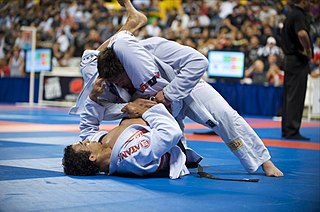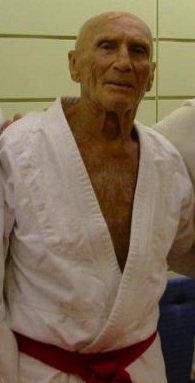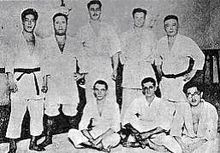
Brazilian jiu-jitsu is a self-defence martial art and combat sport based on grappling, ground fighting, and submission holds. BJJ focuses on taking one's opponent down to the ground, gaining a dominant position, and using a number of techniques to force them into submission via joint locks, chokeholds, or compression locks.

Masahiko Kimura was a Japanese judoka and professional wrestler who is widely considered the greatest judoka of all time. He won the All-Japan Judo Championships three times in a row for the first time in history and had never lost a judo match from 1936 to 1950. In submission grappling, the reverse ude-garami arm lock is often called the "Kimura", due to his famous victory over Gracie jiu-jitsu co-founder Hélio Gracie. In the Japanese professional wrestling world, he is known for being one of Japan's earliest stars and the controversial match he had with Rikidōzan.

Hidehiko Yoshida is a Japanese gold-medalist judoka and retired mixed martial artist. He is a longtime veteran of Japan's PRIDE Fighting Championships, competing in the Middleweight (93kg) and Heavyweight divisions. He won gold at the 1992 Summer Olympic Games at –78 kg. Yoshida also had two famous fights with MMA pioneer Royce Gracie that resulted in a no-contest and a time-limit draw.

Sports in Brazil are those that are widely practiced and popular in the country, as well as others which originated there or have some cultural significance. Brazilians are heavily involved in sports. Football is the most popular sport in Brazil. Other than football, sports like volleyball, mixed martial arts, basketball, tennis, and motor sports, especially Formula One, enjoy high levels of popularity.

Marco Antônio de Lima Ruas is a Brazilian former mixed martial arts fighter, submission wrestler, kickboxer and instructor. Ruas was the UFC 7 Tournament Champion, and also competed for the World Vale Tudo Championship (WVC), PRIDE Fighting Championships and the International Fight League, where he head-coached the Southern California Condors.

Hélio Gracie was a Brazilian martial artist who together with his brothers Oswaldo, Gastao Jr, George and Carlos Gracie founded and developed the self-defense martial art system of Gracie jiu-jitsu, also known as Brazilian jiu-jitsu (BJJ).

Valdemar Santana, sometimes known as Adema Santa, was a Brazilian martial artist who trained in Capoeira under Mestre Bimba and in Brazilian Jiu Jitsu under Hélio Gracie. He was also trained in Luta Livre and boxing.

Carlson Gracie was a practitioner of Brazilian jiu-jitsu. A member of the Gracie family, he was the eldest son of Carlos Gracie, and nephew to Hélio Gracie, founders of Gracie jiu-jitsu.

Carlos Gracie was a Brazilian martial artist who is credited with being one of the primary developers of Brazilian jiu-jitsu. Along with his younger brother Hélio Gracie and fellow students Luis França and Oswaldo Fadda, he helped develop Brazilian jiu-jitsu based on the teachings of famed Japanese judōka Mitsuyo Maeda in Kano Jujitsu (Judo) and is widely considered to be the martial-arts patriarch of the Gracie family.
The Gracie Challenge was an open invitation challenge match issued by members of the Gracie family, representing their self-defense system of Gracie Jiu-Jitsu against challengers of other martial art systems in a vale tudo match, or "anything goes" competition.
The Gracie family is a family of martial artists originally from Belém, state of Pará, Brazil whose ancestors came from Paisley, Scotland. They are known for promoting the self-defense martial arts system of Gracie Jiu-Jitsu, commonly known as Brazilian jiu-jitsu, originating from Kano jiu-jitsu (Judo) brought to Brazil by judoka prizefighter Mitsuyo Maeda.
Professor Leonardo "The Wizard" Xavier was born on January 3, 1976, in Rio de Janeiro, Brazil. At the age of 5, Leo ventured into his first martial art, taking judo in school. At the age of 13 Leo began to take Tae Kwon Do classes. Finally, at the age of 15 a friend introduced him to Brazilian jiu-jitsu.
Saulo Mendonça Ribeiro Filho is a Brazilian submission grappler and former mixed martial artist. He is a 6th-degree black belt in Brazilian jiu-jitsu (BJJ) and brother of Xande Ribeiro. After earning a black belt in judo, he began his training of Brazilian jiu-jitsu in Rio de Janeiro under Royler Gracie, the son of Hélio Gracie, at Gracie Humaitá.

Wellington Leal Dias Santos, known as Megaton Dias, is a Brazilian jiu-jitsu (BJJ) practitioner, and 7th degree coral belt of the Gracie Humaitá jiu-jitsu association under Royler Gracie. Wellington originally trained under Rogerio Camoes and later at the Gracie Humaitá jiu-jitsu school in Rio de Janeiro. Wellington received his black belt at the age of 18. Wellington is currently a coral belt under Royler Gracie.
Mauricio Villardo Reis is best known as Mauricio Villardo. Professor Villardo is a Master Instructor and practitioner of Brazilian Jiu-Jitsu. He holds a sixth-degree black belt in Brazilian Jiu-Jitsu from Royler Gracie, the head instructor of Gracie Humaitá. Mauricio is also a former World Champion of the World Jiu-Jitsu Championship held by the International Brazilian Jiu-Jitsu Federation (IBJJF).

Mayra Aguiar da Silva is a Brazilian judoka. She was a bronze medallist in three consecutive Olympics, 2012, 2016 and 2020. She is also three-time world champion. She is the first Brazilian woman to win three Olympic medals in an individual sport, being the best female judoka in the history of Brazil.

Oswaldo Baptista Fadda was a practitioner and developer of Brazilian jiu-jitsu, reaching the rank of "nono grau", a 9th degree red belt. In 2014, he was posthumously awarded the 10th degree. He is known for being one of the highest ranked non-Gracie black belts and also for teaching students from the poorer areas of Rio de Janeiro, where Brazilian jiu-jitsu was regarded as an upper-class sport. Fadda's lineage, the most prominent second to the Carlos Gracie lineage, still survives through his links with today's teams such as Nova União, Grappling Fight Team, as well as Deo Jiu-Jitsu and Equipe Mestre Wilson Jiu-Jitsu.
Kastriot "Georges" Mehdi was a French-born Brazilian judoka, considered one of the most prominent practitioners of judo in Brazil.
The fight between Japanese judoka Masahiko Kimura and Brazilian jiu-jitsu founder Hélio Gracie was held at the Maracanã Stadium in Rio de Janeiro on October 23, 1951. It was held as a special challenge, with no titles on the line: Gracie was the self-proclaimed national jiu-jitsu champion, seen as a regular judo 6th dan by Kimura, while Kimura himself was coming from a career in professional wrestling and teaching of judo. The result of the fight was a victory for Kimura by technical submission.













